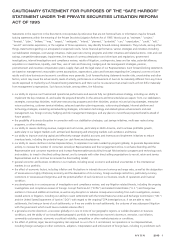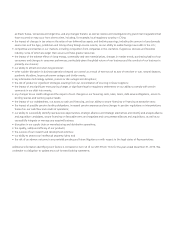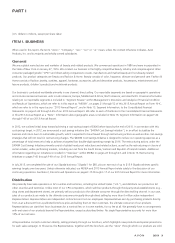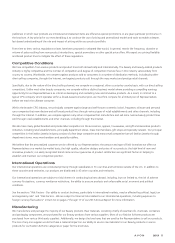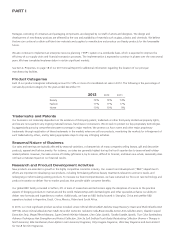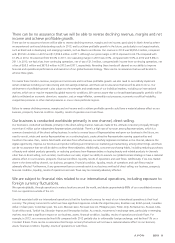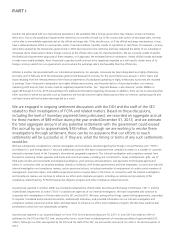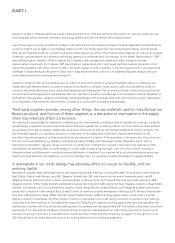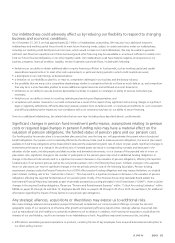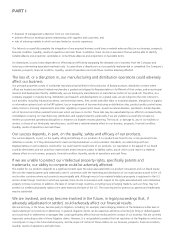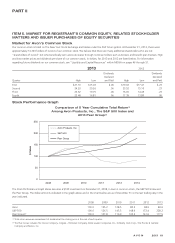Avon 2013 Annual Report Download - page 19
Download and view the complete annual report
Please find page 19 of the 2013 Avon annual report below. You can navigate through the pages in the report by either clicking on the pages listed below, or by using the keyword search tool below to find specific information within the annual report.Our settlement negotiations with the DOJ and the staff of the SEC have continued. In the fourth quarter of 2013, based on the status of our
current negotiations, including the levels of monetary payments being discussed, we recorded an additional accrual of $77 million, resulting
in an aggregate accrual for these matters of $89 million at December 31, 2013. Based on the status of our current negotiations with the
DOJ and the staff of the SEC, we estimate the total aggregate amount of any potential settlements with the government could exceed this
accrual by up to approximately $43 million. While it is reasonably possible that the aggregate monetary payments in any settlements will
exceed $89 million, there is no amount within the estimated potential settlement range that we consider to be a better estimate than any
other amount; therefore, we have accrued the estimated minimum amount of probable loss in connection with the potential settlements of
these matters or $89 million ($77 million during the fourth quarter of 2013 and $12 million during the second quarter of 2013).
Although we are working to resolve the government investigations through settlement, there can be no assurance that our efforts to reach
settlements with the government will be successful or, if they are, what the timing or terms of any such settlements would be. We expect
any such settlements will include civil and/or criminal fines and penalties, and may also include non-monetary remedies, such as oversight
requirements and additional remediation and compliance requirements. We may be required to incur significant future costs to comply with
the non-monetary terms of any settlements with the DOJ and/or the SEC. If we do not reach settlements with the DOJ and/or the SEC, we
cannot predict the outcome of any subsequent litigation with the government but such litigation could have a material adverse effect.
Until these matters are resolved, either through settlement or litigation, we expect to continue to incur costs, primarily professional fees and
expenses, which may be significant, in connection with the government investigations. Furthermore, under certain circumstances, we may
also be required to advance and/or reimburse significant professional fees and expenses to certain current and former Company employees
in connection with these matters.
A general economic downturn, a recession globally or in one or more of our geographic
regions or sudden disruption in business conditions or other challenges may adversely affect
our business, our access to liquidity and capital, and our credit ratings.
A downturn in the economies in which we sell our products, including any recession in one or more of our geographic regions, or current
global macro-economic instability, could adversely affect our business, our access to liquidity and capital, and our credit ratings. Recent
global economic events over the past few years, including unemployment levels, the tightening of credit markets and failures of financial
institutions and other entities, have resulted in challenges to our business and a heightened concern regarding further deterioration globally.
In addition, as mentioned above, our business is conducted primarily in the direct-selling channel. We could experience declines in revenues,
profitability and cash flow due to reduced orders, payment delays, supply chain disruptions or other factors caused by such economic,
operational or business challenges. Any or all of these factors could potentially have a material adverse effect on our liquidity and capital
resources and credit ratings, including our ability to access short-term financing, raise additional capital and maintain credit lines and
offshore cash balances. Avon’s long-term credit ratings are Baa3 (Stable Outlook) with Moody’s and BBB- (Negative Outlook) with S&P,
which are on the low end of investment grade, and BB (Negative Outlook) with Fitch, which is below investment grade. Additional rating
agency reviews could result in a further change in outlook or downgrade, which could limit our access to new financing, particularly short-
term financing, on favorable terms; reduce our flexibility with respect to working capital needs; and adversely affect the market price of
some or all of our outstanding debt securities. See Note 5, Debt and Other Financing on pages F-17 through F-21 of our 2013 Annual
Report for details about the terms of our existing debt and other financing arrangements.
Consumer spending is also generally affected by a number of factors, including general economic conditions, inflation, interest rates, energy
costs, gasoline prices and consumer confidence generally, all of which are beyond our control. Consumer purchases of discretionary items,
such as beauty and related products, tend to decline during recessionary periods, when disposable income is lower, and may impact sales of
our products. We face continued economic challenges in fiscal 2014 because customers may continue to have less money for discretionary
purchases as a result of job losses, foreclosures, bankruptcies, reduced access to credit and weakness in housing, among other things.
In addition, sudden disruptions in business conditions and consumer spending may result from acts of terror, natural disasters, adverse
weather conditions, such as the significant typhoon which impacted the Philippines, and pandemic situations or large scale power outages,
none of which are under our control.
A V O N 2013 11


